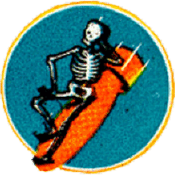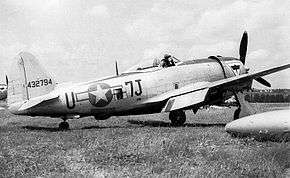508th Fighter Squadron
| 508th Fighter Squadron | |
|---|---|
|
508th Fighter Squadron Republic P-47D Thunderbolt 44-32794 | |
| Active | 1943-1945 |
| Country |
|
| Branch | United States Army Air Forces |
| Type | Fighter |
| Size | [[]] |
| Nickname(s) | 508th Air force, Granite |
| Battle honours | Distinguished Unit Citation French Croix de Guerre with Palm Belgian Fourragère |
| Insignia | |
| 508th Fighter Squadron Emblem (approved 22 June 1943)[1] |
 |
The 508th Fighter Squadron is an inactive United States Army Air Forces unit. It was last assigned to the 404th Fighter Group at Drew Field, Florida, where it was inactivated on 9 November 1945. The squadron saw combat in the European Theater of Operations with Ninth Air Force as a fighter-bomber unit during World War II. It was decorated by the American, French, and Belgian governments for its actions during the war.
History
The squadron was established as the 622d Bombardment Squadron (Dive) and activated on 4 February 1943 at Key Field, Mississippi[1] as one of the four original squadrons of the 404th Bombardment Group.[2] The squadron trained with Douglas A-24 Banshee (Dauntless) dive bombers and Bell P-39 Airacobra fighters and was redesignated the 508th Fighter-Bomber Squadron in August.[1] After training was completed at Myrtle Beach Army Air Field, South Carolina, the 508th deployed to the European Theater of Operations, where it became part of IX Fighter Command in England and was assigned Republic P-47 Thunderbolts. The squadron became operational on 1 May 1944[2] and was redesignated as a fighter squadron at the end of the month.[1]
The squadron began operations by bombing and strafing targets in France to prepare for Operation Overlord, the Normandy invasion. It provided top cover for landings in Normandy on 6 and 7 June 1944. On 6 July the squadron moved across the English Channel to its advanced landing ground at Chippelle Airfield, France.[1] It provided close air support for ground troops until the end of the war, The 508th assisted the United States First Army in the breakout at Saint-Lô on 28 through 31 July, when despite severe losses from flak, the squadron and the other squadrons of the 404th group provided cover for four armored divisions. It supported the drive through the Netherlands in September 1944, Allied operations during the Battle of the Bulge from December 1944 to January 1945, and Operation Lumberjack, and helped defend the expansion of Remagen bridgehead on the east side of the Rhine during March 1945.[2]
The squadron also flew air interdiction, strafing and bombing troop concentrations, railroads, highways, bridges, fuel and ammunition dumps, armored vehicles, docks and tunnels. In addition, it flew fighter escort missions, covering operations of Boeing B-17 Flying Fortresses, Consolidated B-24 Liberators and Martin B-26 Marauders.[2]
The squadron received a Distinguished Unit Citation for three armed reconnaissance missions it flew on 10 September 1944. Despite adverse weather and flak, the squadron attacked enemy communications, rolling stock and factories to support advancing ground forces. It was also awarded the Belgian Fourragère after being cited three times in the Belgian Army Order of the Day for operations contributing to the liberation of the Belgian people.[2]
After the surrender of Germany, the squadron became part of the occupying United States forces though the summer of 1945. It aided in disarming the Luftwaffe and dismantling the German aircraft industry.[2] The 508th returned to the United States and was inactivated in early November.[1]
Lineage
- Constituted as the 622d Bombardment Squadron (Dive) on 25 January 1943
- Activated on 4 February 1943
- Redesignated 508th Fighter-Bomber Squadron on 10 August 1943
- Redesignated 508th Fighter Squadron, Single Engine on 30 May 1944
- Inactivated on 9 November 1945[1]
Assignments
- 404th Bombardment Group (later 404th Fighter-Bomber Group, 404th Fighter Group): 5 February 1943 - 9 November 1945[1]
Stations
|
|
Aircraft
- Douglas A-24 Banshee, 1943-1944
- Bell P-39 Airacobra, 1943-1944
- Republic P-47 Thunderbolt, 1944-1945[1]
Awards and Campaigns
| Award streamer | Award | Dates | Notes |
|---|---|---|---|
| Distinguished Unit Citation | 10 September 1944 | 508th Fighter Squadron[1] | |
| French Croix de Guerre with Palm | 29, 30 and 31 July 1944 | 508th Fighter Squadron[1] | |
| Belgian Fourragere | 6 June 1944-30 September 1944, 1 October 1944 – 17 December 1944, 18 December 1944 – 15 January 1945 | 508th Fighter Squadron[1] |
| Campaign Streamer | Campaign | Dates | Notes |
|---|---|---|---|
| Air Offensive, Europe | 5 April 1944 – 5 June 1944 | 508th Fighter-Bomber Squadron (later Fighter Squadron)[1] | |
| Normandy | 6 June 1944 – 24 July 1944 | 508th Fighter Squadron[1] | |
| Northern France | 25 July 1944 – 14 September 1944 | 508th Fighter Squadron[1] | |
| Rhineland | 15 September 1944 – 21 March 1945 | 508th Fighter Squadron[1] | |
| Ardennes-Alsace | 16 December 1944 – 25 January 1945 | 508th Fighter Squadron[1] | |
| Central Europe | 22 March 1944 – 21 May 1945 | 508th Fighter Squadron[1] | |
| Air Combat, EAME Theater | 5 April 1944 – 11 May 1945 | 508th Fighter Squadron[1] | |
| American Theater[5] | 5 February 1943 – 13 March 1944 | 622d Bombardment Squadron (later 508th Fighter-Bomber Squadron)[1] | |
| World War II Army of Occupation[5] | 9 May 1945 – 2 August 1945 | 508th Fighter Squadron |
See also
References
Notes
- 1 2 3 4 5 6 7 8 9 10 11 12 13 14 15 16 17 18 19 20 21 Maurer, Maurer, ed. (1982) [1969]. Combat Squadrons of the Air Force, World War II (PDF) (reprint ed.). Washington, DC: Office of Air Force History. p. 611. ISBN 0-405-12194-6. LCCN 70605402. OCLC 72556.
- 1 2 3 4 5 6 Maurer, Maurer, ed. (1983) [1961]. Air Force Combat Units of World War II (PDF) (reprint ed.). Washington, DC: Office of Air Force History. ISBN 0-912799-02-1. LCCN 61060979.
- ↑ Station number in Anderson, Capt. Barry (1985). Army Air Forces Stations: A Guide to the Stations Where U.S. Army Air Forces Personnel Served in the United Kingdom During World War II (PDF). Maxwell AFB, AL: Research Division, USAF Historical Research Center. Retrieved 7 July 2012.
- 1 2 3 4 5 6 Johnson, 1st Lt. David C. (1988). U.S. Army Air Forces Continental Airfields (ETO) D-Day to V-E Day (PDF). Maxwell AFB, AL: Research Division, USAF Historical Research Center.
- 1 2 Service Streamer
Bibliography
![]() This article incorporates public domain material from the Air Force Historical Research Agency website http://www.afhra.af.mil/.
This article incorporates public domain material from the Air Force Historical Research Agency website http://www.afhra.af.mil/.
- Anderson, Capt. Barry (1985). Army Air Forces Stations: A Guide to the Stations Where U.S. Army Air Forces Personnel Served in the United Kingdom During World War II (PDF). Maxwell AFB, AL: Research Division, USAF Historical Research Center. Retrieved 7 July 2012.
- Johnson, 1st Lt. David C. (1988). U.S. Army Air Forces Continental Airfields (ETO) D-Day to V-E Day (PDF). Maxwell AFB, AL: Research Division, USAF Historical Research Center.
- Maurer, Maurer, ed. (1983) [1961]. Air Force Combat Units of World War II (PDF) (reprint ed.). Washington, DC: Office of Air Force History. ISBN 0-912799-02-1. LCCN 61060979.
- Maurer, Maurer, ed. (1982) [1969]. Combat Squadrons of the Air Force, World War II (PDF) (reprint ed.). Washington, DC: Office of Air Force History. ISBN 0-405-12194-6. LCCN 70605402. OCLC 72556.

.svg.png)
.svg.png)